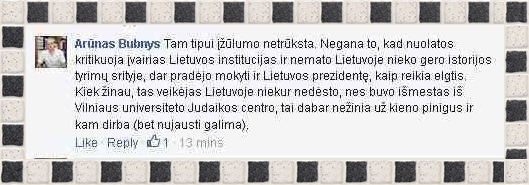O P I N I O N
◊
VILNIUS–Genocide Center historian Dr. Arūnas Bubnys has posted on Facebook the following comment about this journal’s editor.

In translation:
Arūnas Bubnys: “Why, the nerve of that guy! It’s not enough that he
constantly criticizes different Lithuanian institutions and sees nothing
positive in the area of history research in Lithuania, he has now begun to teach the Lithuanian president how to act correctly. As far as I know
this operator doesn’t teach anywhere in Lithuania because he was thrown out of the Judaica Center of Vilnius University, so that now it’s not really known who’s paying him and for whom he works (although one can guess).”
It is quite true that Dr. Bubnys’s works, sponsored by the state’s Genocide Center where he is a senior historian, have been criticized on these pages (see e.g. editor’s review of his book on the Vilna Ghetto, where there are links to his publications on far-right sites such as Patriotai.lt and his efforts to raise funds for memorials for pro-Nazi forces).
Just to dispel any doubt, let it here be stated unequivocally, that Dr. Bubnys, as with any author whose books (or activities) are reviewed on these pages, is most welcome to respond, and is guaranteed the courtesy of a separate post/page for the reply (with any further response to come, once again, on a separate page).
As for the Genocide Center historian’s post on Facebook, there seems to be a further difference of opinion on the nature of EU and NATO democracy. Is a person allowed to publish a disagreement with the president’s choice of activities at the Holocaust mass grave site Ponár, or indeed, her government’s Holocaust policies? If not, why not?
What civic lessons do government historians wish to teach the vibrant new generation of open-minded young people in Lithuania? That if they speak up about the Holocaust and happen to disagree with the president’s or government’s or Genocide Center’s attempts at obfuscation and revisionism, that they will then be disemployed and trashed by historians of state institutions as ipso facto payrolled lackies of Moscow?
Incidentally, this journal’s editor’s views about Soviet and Russian questions have been made eminently clear on many occasions, among them in a reply to an article in Lithuanian Foreign Policy Review several years ago, and at a conference in Kiev.
As for the circumstances of our editor’s departure from Vilnius University, they go right to the heart of the point made above about fostering a civil society where disagreement with state-sponsored ultranationalist history does not cause disemployment (the spirit of: “First they fire you for having another opinion on government history policy, then they say Ha-ha, he’s not even at the university…”). We are posting a growing collection of documents to set the record absolutely straight.